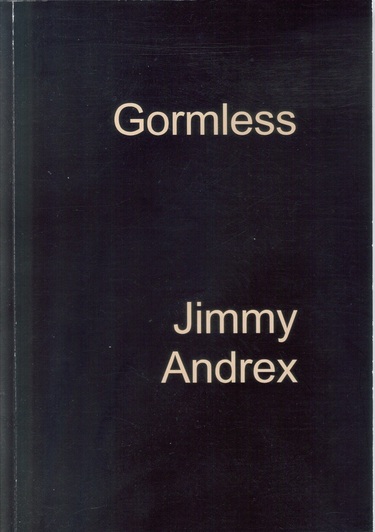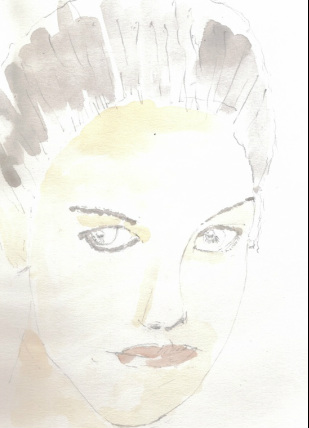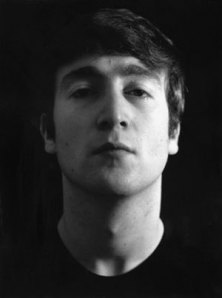With its layers of self-deprecation and irony, the title Gormless suggests that there is something very modern, if not post-modern, taking place here; Jimmy Andrex is laying down a false trail and at the crossroads we might well ask about which way we should turn.
Everyone might write it, but few people buy it. What is the current standing of poetry? Beware those who take themselves seriously in their poetic output with their seedy insinuations: “do you want to read some of my stuff?” And beware in particular those who consciously seek the aura of poet. As Blackadder so pithily explained to Mrs Miggins, “…there’s nothing intellectual about wandering around Italy in a big shirt trying to get laid.”
Wordsworth turned the whole world of English poetry on its head and announced in his Preface to the Lyrical Ballads in 1802, “Poetry is…the spontaneous overflow of powerful feelings: it takes its origin from emotion recollected in tranquillity.” Plenty argue that Wordsworth’s view still holds sway, aren’t we all, after all, still Romantics?” But over a hundred years later, T.S. Eliot, writer of the most influential poem of the twentieth century (The Waste Land) said, “poetry…is neither emotion, nor recollection, nor without distortion of meaning, tranquillity.” He goes on to say that poetry is an escape from emotion and personality.
This makes for a tricky template for poets looking for guiding principles. They could be forgiven for expressing confusion about how to go about their chosen craft particularly as almost another hundred years have passed since Eliot’s edict. What is certain is that the world, in MacNeice’s memorable phrase, is “suddener than we fancy it…crazier and more of it than we think.”
What now of poets and poetry? Does Shelley’s claim that poets are unacknowledged legislators have any sway? Can anyone argue against Auden’s claim that “my poetry didn’t save one Jew from the gas chambers?” What is Jimmy Andrex’s take on this sudden and crazy world, and how does he go about his response? Is he a recollector of emotion or a cool, detached observer? Crap Town provides some clues:
“…whining like a bitten, beaten bull
terrier in a pit,
studded choke chain a comfortable
suffocating fit,
slavering, alert right down to the white
eyes down for Oxfam thrills on Friday night.”
Evidence here of poetry continuing to evolve, and in order to chart the human condition, a poet continuing to harness powerful emotion but stay aloof in expression, allowing readers their chosen response to the individual and urban decay of the twenty-first century.
“while your frailties blossom like a field of sunset spires,
While some kid hooplas a lamppost with an old bike tyre.”
A Dog Called Tyson
This is Jimmy Andrex, the urban warrior with a notebook taking on and capturing the vicissitudes of late night taxi ranks and housing estates that are more than frayed around the edges. Here is the voice of an individual amongst the anonymous masses who have grasped the possibilities of the technological revolution and reveal themselves only by mobile phone conversations on trains:
“How you started with texts
met two Saturdays for sex,
you both said you were working.
Now you’re left dreaming
of dress down Friday, clutching
cardboard cups on a train.”
On a Train
How tempting to jump at a convenient peg or pigeon hole! Yet this image I’ve suggested is not anywhere near half the story. This collection has plenty of grit and it relentlessly reveals a grisly way of life for many, but there is also delight in the delicate, the beauty for instance inherent in a Leeds Station Winter Sunset:
“Satsuma reflected on a sun’s breath moisture,
ripped apart cotton wool,
in a quandary whether to remain
or give in to black.”
Or the inspiration to be found in the work of others:
“A small moored boat like a blank page
invites us to take up the oars.
Blood and lungs pumping while angel words
echo as bottomless ink ripples.”
The Reading
There is a range in this collection which shames those who make easy assumptions, there’s a depth of expression which defies a neat summary in a review as brief as this, and there is a voice revealed which encompasses powerful feelings and tranquil reflections, a voice which can engage and disengage the personality. Furthermore, the words are chosen with care, the poems, for all their raw energy, are finely crafted and the collection repays second, third and subsequent readings. Heaney spoke of poets as being “artful” voyeurs and Wordsworth and Eliot would both approve particularly when the place of poetry, that most ancient of art forms, is affirmed. And affirmation is necessary as poetry has been shaped and remodelled to suit notions of what is appropriate for our electronic age; always flexible, it has borne with patience image consultants asking it to try out rap, performance and slam as credible alter egos. It has even been asked for an embarrassing period to pose as the new rock and roll.
But poetry can shrug off modishness, it has survived canonisation in the school curriculum and it is still the turn-to art form when we are confronted by tragedy, personal crisis or love. It is hard-wired into our psyches as fundamentally as our mothers’ heartbeats. For it is words on the page, their rhythms and resonances, which allow both writer and reader to reflect, it is poetry which acts as that most compelling touchstone on experience. How else to approach the stored cask of infertility or the agony of grief:
“The chance to swap still life
for risking every bump
on a bike with no brakes,
gone like the perfect day out,
paper memories in a box.”
I Wasn’t Sure But I Could Tell
Poetry, as Gormless demonstrates is also the perfect medium for Andrex and his ability to capture shifts in relationships, ruptures and reconciliations, the nuances of ordinary talk which illuminate the big picture as in Runner Beans:
“When Summer’s temper cools, we can both walk
down whispering gravel paths, pick runners, talk
of plans for next year’s garden and savour
the harvest moment, the fresh beans flavour,”
And it is the words on the pages of Gormless which render redundant the question, why a slender volume of verse? Poetry has braved the ebb and flow of critical approaches, poetry is both arcane and cutting edge, but the age of an elite determining poetic taste has passed. Emancipated by the technological revolution and the ways and means at our disposal we can approach the signpost which is Gormless, be guided by it, but choose our own direction.




 RSS Feed
RSS Feed
